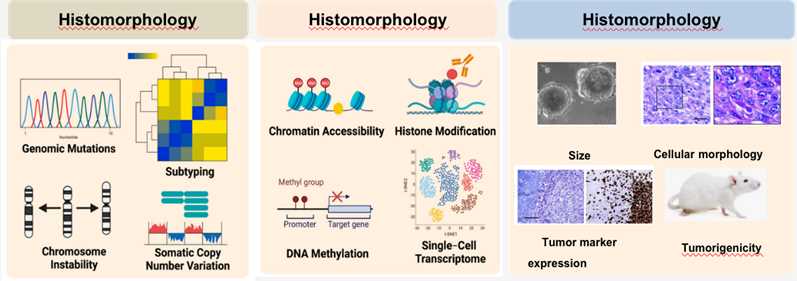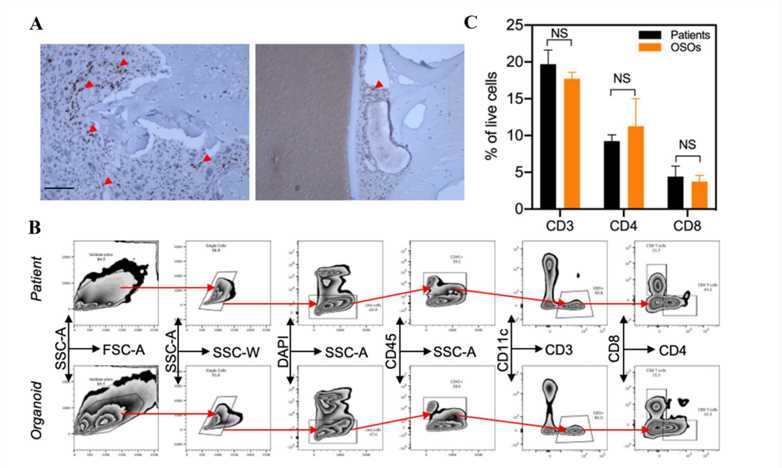All products and services are For Research Use Only and CANNOT be used in the treatment or diagnosis of disease.
Osteosarcoma (OS) is a primary bone cancer that often occurs in adolescents and old populations with the features of high heterogeneity, malignant, and high chance of mortality. Osteosarcoma is mesenchymal cells-originated cancer, which differentiates from most epithelial-derived tumors, can metastasize to the lung, and develops strong drug resistance.
Cancer organoids are in vitro models imitating the three-dimensional structure of tumor tissues, retaining the interactions of tumor cells with complex environments, and therefore have become a prevail clinical associated tool for the study of tumor formation and progression and developing effective therapies for treatment.
Creative Biolabs is experienced in organoid establishment and CAR-T construction. Within our cancer organoids platform, we applied advanced techniques and innovative strategies for cancer biology study and immunotherapy development.
 Fig.1 Scheme of the OS organoid production. (He, et al., 2020)
Fig.1 Scheme of the OS organoid production. (He, et al., 2020)
With increasing knowledge in organoid production, Creative Biolabs helps explore optimal strategies for the establishment of osteosarcoma cancer organoids.
| Type | Description | Features |
| Single tumor cell-based organoid | Single cells are collected from tissues and colonial expansion to organoid culture. |
|
| Small tissue pieces-based organoid | Minced small fragments are cultured on pre-solidified collagen. |
|
| Microfluidic system-based organoid | Apply the advanced microfluidic device for tumor culture in a small volume of channels. |
|
 Fig.2 Characterization of organoids using molecular and histological approaches. (Nam, et al., 2022)
Fig.2 Characterization of organoids using molecular and histological approaches. (Nam, et al., 2022)
The physiological-related cancer organoid models are suitable for preclinical tests of the response of developed CAR-T cells in vitro.

Creative Biolabs is committed to cell therapy development. We provide various CAR-T cell therapy-related products and offer CAR-T development services for osteosarcomas, which are combined with a cancer organoid platform to help you have a complete evaluation of the safety and efficacy of engineered T cells.
| Target Antigen | Target Description | CAR-T Products |
| GD2 | GD2 is a glycosphingolipid that overexpresses on neuroblastoma and osteosarcomas cells and is a promising target for immunotherapies. | Anti-GD2 CAR-T |
| Develop Osteosarcoma Cancer Organoid Models from Primary OS Tumor and Lung Metastatic OS |
Abstract:
|
 Fig.3 Osteosarcoma cancer organoids mimic the original patient's tumor on morphological and histological characteristics. (He, et al., 2020) |
 Fig.4 T cells are present in cancer organoids as they are distributed in tumor tissue. (He, et al., 2020) |
Cancer organoid is an innovative model that introduces great changes to cancer studies. Creative Biolabs provides 2D cancer cell lines, 3D organoid models, as well as animal models for CAR-T in vitro and in vivo efficacy tests. Please contact us for detailed information.
References
For any technical issues or product/service related questions, please leave your information below. Our team will contact you soon.
 NEWSLETTER
NEWSLETTER
The latest newsletter to introduce the latest breaking information, our site updates, field and other scientific news, important events, and insights from industry leaders
LEARN MORE NEWSLETTER NEW SOLUTION
NEW SOLUTION
CellRapeutics™ In Vivo Cell Engineering: One-stop in vivo T/B/NK cell and macrophage engineering services covering vectors construction to function verification.
LEARN MORE SOLUTION NOVEL TECHNOLOGY
NOVEL TECHNOLOGY
Silence™ CAR-T Cell: A novel platform to enhance CAR-T cell immunotherapy by combining RNAi technology to suppress genes that may impede CAR functionality.
LEARN MORE NOVEL TECHNOLOGY NEW SOLUTION
NEW SOLUTION
Canine CAR-T Therapy Development: From early target discovery, CAR design and construction, cell culture, and transfection, to in vitro and in vivo function validation.
LEARN MORE SOLUTION